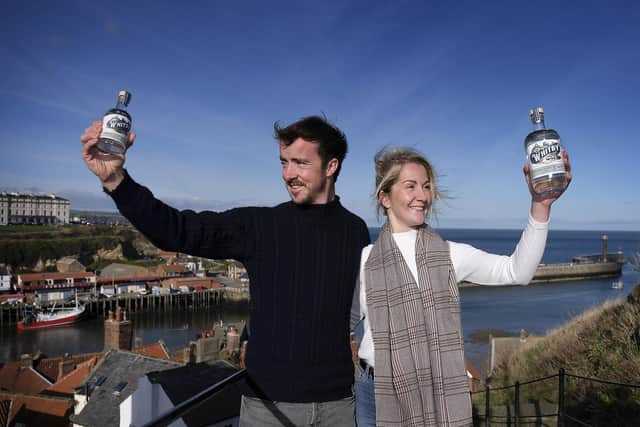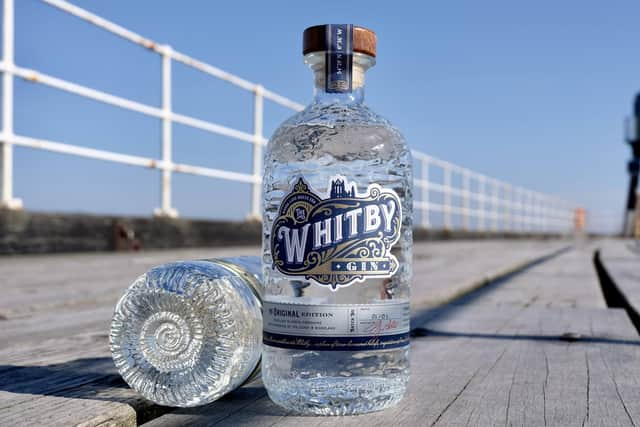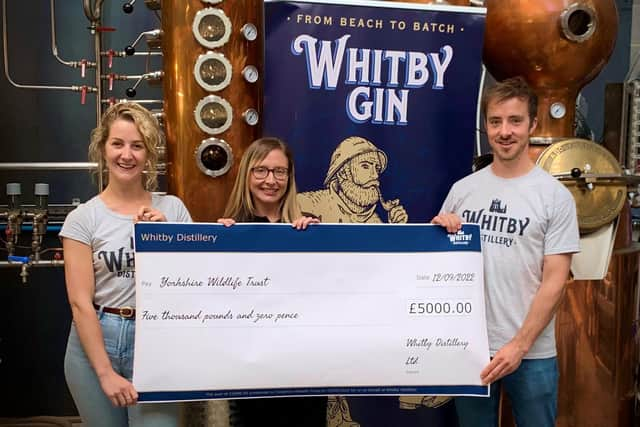Whitby Gin teams up with Yorkshire Wildlife Trust as it donates to sea preservation scheme
Whitby Distillery, the producers of the award-winning Whitby Gin, have underlined their commitment to the planet with a £5,000 donation to Yorkshire Wildlife Trust as the business also airs plans to expand its business and offering.
The donation will support the Trust’s Give Seas A Chance campaign, which seeks to protect and restore Yorkshire’s incredible seascape.
Advertisement
Hide AdAdvertisement
Hide AdYorkshire Wildlife Trust is championing natural climate solutions like the restoration of seagrass meadows and oyster beds to naturally clean up our seas and trap carbon.


The Trust also campaigns for bigger and better-managed Marine Protected Areas, the nature reserves of the sea, and runs a number of local community projects such as Fishing for Litter and regular beach cleans.
Jess Slater, co-founder of Whitby Distillery with her partner Luke Pentith, explained that this donation was part of their contribution to the 1% For The Planet movement, a global network of
businesses, individuals and environmental organisations tackling the planet’s most pressing environmental issues.
Advertisement
Hide AdAdvertisement
Hide Ad

She said: “We are acutely aware of the many pressures facing our fragile environment today and we strongly believe that every responsible business, large or small, should play their part in reducing global warming and looking after our precious planet.
"Both Luke and I regard it as our responsibility to do as much as we possibly can to preserve and enhance our beautiful Whitby and North Yorkshire surroundings.
“The 1% For The Planet campaign is brilliant in its simplicity. It just asks supporters to donate one per cent of their annual revenue to fund diverse environmental organisations so that collectively they can be a more powerful source in solving the world’s problems. It’s important to stress that donations come from revenue not profit.”
Whitby Distillery is forging a strong relationship with Yorkshire Wildlife Trust as plans move forward to relocate the distillery from its current base on Botany Way in Whitby to a derelict barn site in the shadow of Whitby Abbey, which is nearer to the dramatic cliffs and rugged coastline.
Advertisement
Hide AdAdvertisement
Hide Ad

Ms Slater explained: “We are planning to restore two derelict barns close to the abbey, giving them an exciting new life through sensitive conversion and extension and providing an enchanting new home for our award-winning gin.
"A crucial part of this restoration will be to ensure that the green areas and grass roof at our new site will nurture wildlife.”
She stressed that the distillery’s commitment to a green agenda was an essential part of its philosophy and everyday activity.
The distillery’s commitment to sustainability includes:
Local box/case reuse and recycling Bottles manufactured in Yorkshire Zero plastic used in packaging Locally foraged ingredients from the North York Moors and the North Sea coast Work with Scarborough-based seaweed farming and processing company Seagrown and use of seaweeds in its gin
Advertisement
Hide AdAdvertisement
Hide AdMs Slater said: “Taken together, these initiatives make a real difference. In addition, we are embarking on a juniper planting project with the Egton Estate.
"We are working with the estate to understand the best areas to plant and how it can encourage the wildlife there. It is early days but one day, we would like to harvest the juniper to use in our gin.”
Luke Pentith added: “These are exciting times for us, as our award-winning gin becomes increasingly popular across the UK and we look to move into superb new premises, which will include a visitor centre.
"Underlying all our efforts is a commitment to sustainability, which is such an integral part of our whole business”.
Advertisement
Hide AdAdvertisement
Hide AdWhitby Gin was set up in 2017 and came about after the couple had been inspired by the artisan gin-makers they had met on a camping trip to The Outer Hebrides.
They wanted to make a gin that reflected Whitby and the first bottles of Whitby Gin were produced nine months later, in a utility room at Mr Pentith’s parents’ house.
They would go on to produce 3,000 bottles here whilst continuing to work full-time 100 miles across the country before moving to Botany Way.

